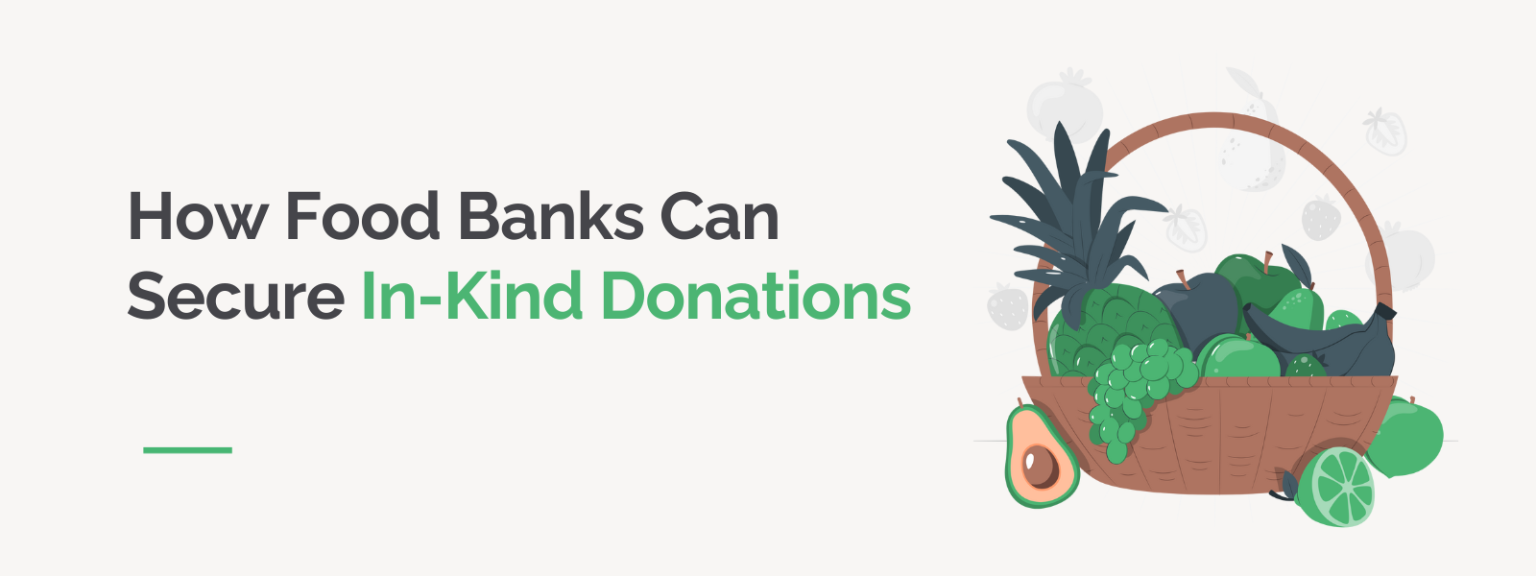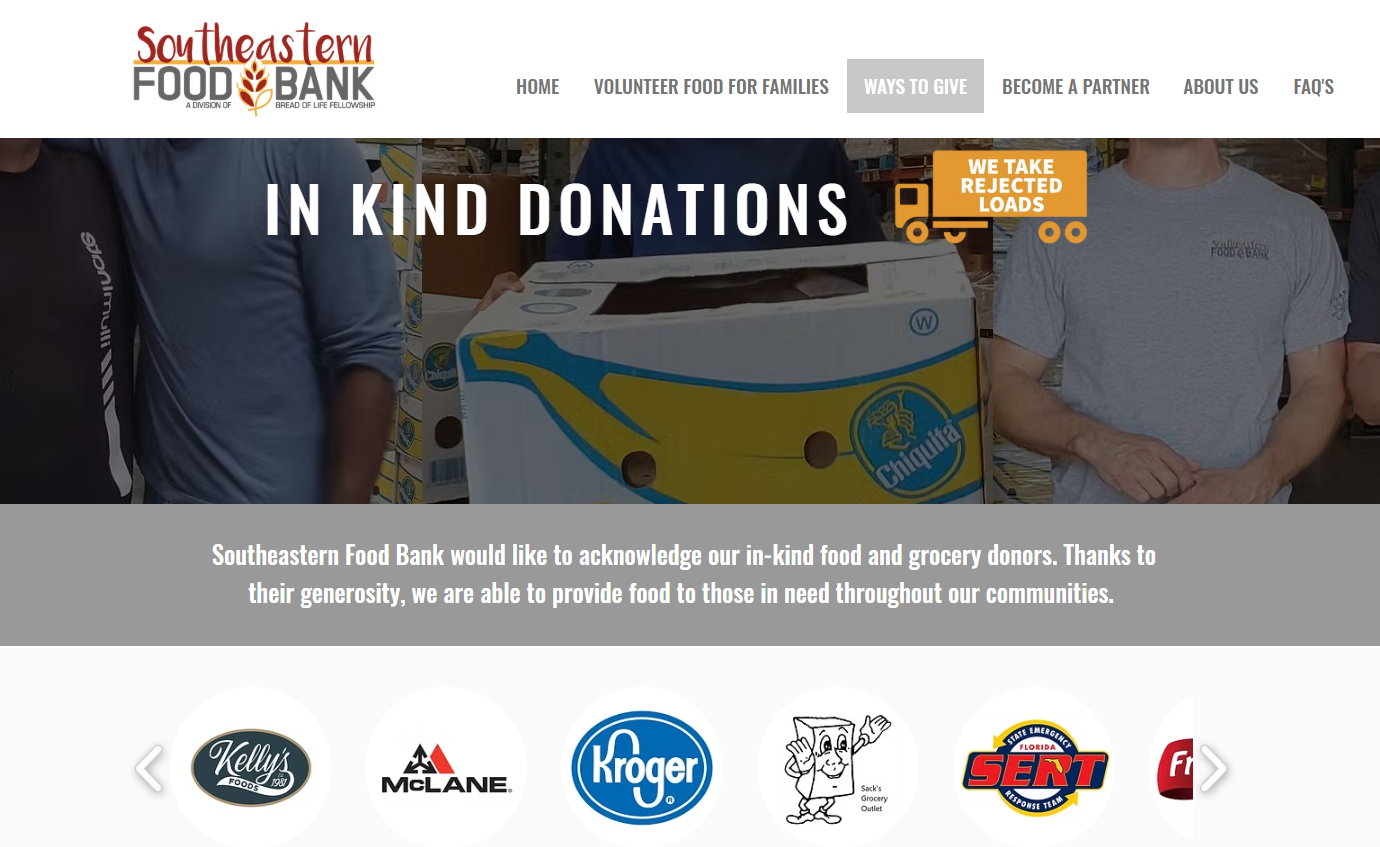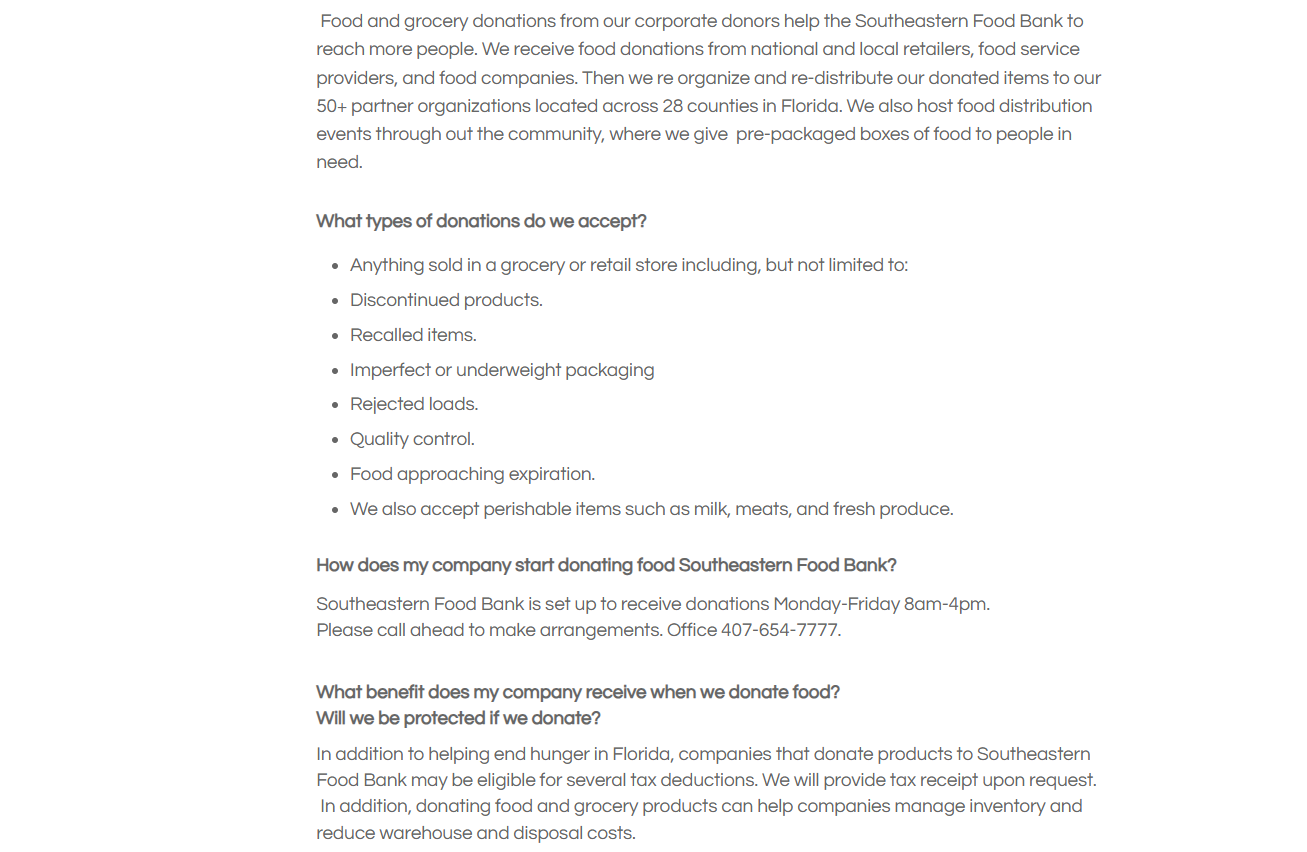How Food Banks Can Secure In-Kind Donations
Food banks play a vital role in addressing food insecurity by providing essential nourishment to individuals and families in need. To sustain and expand their impact, these organizations often rely on a variety of resources beyond traditional cash donations. One of the most valuable forms of support they can receive is in-kind donations, which include goods and services that directly support their mission.
Securing in-kind donations requires a strategic approach tailored to the unique needs of food banks. Unlike monetary gifts, in-kind contributions can include everything from baked goods and beverages to baby formula and non-perishable food items. These donations not only help reduce operational costs but also ensure that food banks can distribute a diverse range of nutritious options to their communities.
Understanding how to effectively identify, request, and manage in-kind donations is essential for nonprofit professionals working in food banks. By leveraging best practices and building strong partnerships with corporate donors, food banks can maximize their resources and better serve those who depend on them.
Table of Contents
- What Are In-Kind Donations for Food Banks?
- Types of In-Kind Donations for Food Banks
- Where Food Banks Should Look for In-Kind Support
- How Food Banks Should Make the In-Kind Donation Ask
- Tools and Resources to Help Food Banks Get Started
- Success Story: Southeastern Food Bank’s In-Kind Strategy
What Are In-Kind Donations for Food Banks?
In-kind donations refer to non-cash gifts that a nonprofit organization receives to support its operations and programs. These can include tangible items such as food, clothing, and equipment, as well as services like legal advice, transportation, and marketing support. Unlike traditional cash donations, which provide financial flexibility, in-kind gifts offer specific resources that directly address an organization’s immediate needs.
For food banks, in-kind donations are particularly impactful because they often involve the very products that fulfill their core mission: feeding people. Receiving donated food items, beverages, or baby formula allows food banks to allocate their financial resources toward other critical areas, such as distribution logistics, infrastructure, and outreach programs.
Moreover, in-kind donations help food banks maintain a steady supply of nutritious and diverse food options, which is essential for meeting the dietary needs of different populations. By partnering with companies that specialize in food production and distribution, food banks can secure consistent, high-quality donations, thereby enhancing their ability to serve their communities effectively.
How In-Kind Donations Differ from Cash Gifts
While cash gifts provide nonprofits with the flexibility to allocate funds where they are most needed, in-kind donations offer specific goods or services that can reduce operational expenses or directly support program delivery. For food banks, this means receiving food items or related supplies that can be distributed immediately, rather than purchasing them with donated funds.
This distinction is important because it allows food banks to stretch their budgets further and respond quickly to urgent needs. However, managing in-kind donations also requires careful coordination to ensure that the items received align with the organization’s capacity and client needs.
Why In-Kind Donations Are Especially Relevant to Food Banks
Food banks operate in a sector where the direct provision of goods is a central part of their mission. In-kind donations of food and beverages directly translate into meals for individuals and families facing food insecurity. This makes such donations not only practical but mission-critical.
Additionally, in-kind gifts can include essential non-food items, such as baby formula, which addresses the nutritional needs of infants and young children—a demographic that requires specialized support. By securing these donations, food banks can offer comprehensive assistance that goes beyond basic hunger relief.
In-kind donations also foster community engagement by involving local businesses and corporations in tangible ways. When companies contribute products or services, they become active partners in the fight against hunger, which can lead to long-term relationships and increased support.
Types of In-Kind Donations for Food Banks
Food banks benefit from a wide range of in-kind donations that help them fulfill their mission efficiently and effectively. Below are some specific examples of valuable in-kind gifts that food banks should consider pursuing:
Baked Goods
Baked goods such as bread, pastries, and cookies are popular donations that provide immediate, ready-to-eat options for food bank clients. These items add variety and comfort to food packages and can be sourced from local bakeries or large food manufacturers. Baked goods are especially appreciated because they often have a shorter shelf life and can be challenging for food banks to purchase regularly.
Beverages
Donations of beverages, including bottled water, juice, and shelf-stable drinks, are essential for hydration and nutrition. Beverages from companies can help food banks offer balanced food packages and meet the diverse preferences of their clients. These donations also reduce the need for food banks to allocate funds toward purchasing drinks.
Non-Perishable Food
Non-perishable food items such as canned vegetables, pasta, rice, and cereals are staples for food banks. These products have a long shelf life, making them ideal for storage and distribution over time. Donations from manufacturing conglomerates often include these types of goods, which help food banks maintain a consistent inventory to meet ongoing demand.
Baby Formula
Baby formula is a critical donation category that addresses the nutritional needs of infants and young children. Because formula can be expensive and requires specific handling, donations from manufacturers or retailers can significantly ease the burden on food banks and ensure that families with babies receive appropriate nourishment.
Transportation and Logistics Services
In-kind donations are not limited to food products. Services such as transportation, warehousing, and logistics support are invaluable for food banks. Skilled volunteer drivers or partnerships with delivery companies can help food banks expand their reach and improve the efficiency of food distribution.
Packaging Supplies
Donations of packaging materials like boxes, bags, and containers help food banks safely store and distribute food items. These supplies reduce operational costs and ensure that food reaches clients in good condition.
Where Food Banks Should Look for In-Kind Support
Identifying potential sources of in-kind donations requires a strategic approach. Food banks should begin by researching companies with corporate social responsibility (CSR) programs that align with their mission to combat hunger and support communities. Many corporations prioritize giving back through product donations, volunteer programs, and sponsorships.
Local businesses engaged in community impact initiatives are also excellent partners. These companies often seek opportunities to contribute to causes that resonate with their customers and employees. Building relationships with retailers, manufacturers, and service providers relevant to the food industry can open doors to valuable in-kind support.
Below are some notable companies known for their in-kind donation programs that align well with food banks:
Walmart
Walmart offers a variety of non-perishable food items such as canned goods and foods. Their in-kind donations help food banks diversify their food offerings and meet client preferences. Walmart’s commitment to fighting hunger makes them a natural partner for food banks.
General Mills
General Mills is known for donating cereals, baking mixes, and other pantry essentials. Their corporate giving programs often include product donations and grants that support food security efforts. Partnering with General Mills can provide food banks with consistent access to staple foods.
Kroger
Kroger, as a major grocery retailer, donates surplus food items including fresh produce, dairy, and bakery goods. Their community outreach programs focus on reducing food waste and supporting local food banks, making them a key resource for in-kind donations.
Coca-Cola
Coca-Cola contributes beverages and sometimes event sponsorships that help food banks with fundraising efforts. Their donations support hydration needs and community engagement, aligning well with food bank programs.
Pepsi
Pepsi provides a range of beverages and snack products as in-kind donations. Their corporate social responsibility initiatives emphasize community health and wellness, which complements the goals of food banks.
How Food Banks Should Make the In-Kind Donation Ask
Making a successful in-kind donation request requires a thoughtful and strategic approach. Building long-term relationships with corporate donors is essential, as it fosters trust and increases the likelihood of ongoing support. Aligning the nonprofit’s needs with the company’s mission and values creates a compelling case for partnership.
When reaching out, personalization is key. Tailor the message to reflect the company’s past giving history, CSR focus, or shared community goals. Clearly articulate what specific items or services the food bank needs and explain how these donations will be used to make a tangible impact.
Highlighting the benefits to the company can motivate giving. These benefits might include increased visibility through recognition, enhanced community goodwill, opportunities for employee engagement, and potential tax incentives. Offering flexible donation options—such as physical goods, services, gift cards, or event sponsorships—makes it easier for companies to say yes.
Finally, simplify the process by providing a detailed wish list, shipping instructions, and a direct contact person. Making it easy for donors to follow through reduces barriers and encourages timely contributions.
Personalize Your Outreach
Research the company’s values and tailor your request to resonate with their priorities. Mention any previous collaborations or relevant community initiatives to build rapport.
Be Clear and Specific
Specify the types and quantities of items needed, and explain how these donations will support your programs. Transparency builds confidence and trust.
Emphasize Mutual Benefits
Outline how the company will benefit from the partnership, including public recognition and employee engagement opportunities.
Offer Flexible Giving Options
Allow donors to choose from various ways to contribute, accommodating their capabilities and preferences.
Make It Easy to Give
Provide all necessary information upfront, including logistics and contact details, to streamline the donation process.
Tools and Resources to Help Food Banks Get Started
Nonprofit professionals in the food bank sector can greatly benefit from using dedicated tools to identify and secure in-kind donations more efficiently. Many companies have established in-kind donation programs with specific application processes, but these opportunities are often scattered across multiple platforms and websites, making manual research time-consuming.
Using specialized tools helps food banks uncover corporate giving programs that align with their mission quickly. These platforms provide centralized access to application links, eligibility criteria, and program details, saving valuable time and effort. Additionally, they enable nonprofits to track and organize outreach efforts, ensuring no opportunity is overlooked.
Expanding the network of potential in-kind partners becomes easier with these resources, as they reveal companies that might not have been on the nonprofit’s radar. This broader reach can lead to new and diverse sources of support.
Double the Donation offers a comprehensive corporate giving program database that includes thousands of verified programs, covering in-kind donations, grants, and workplace giving. This industry-leading solution empowers food banks to streamline their fundraising strategies and build meaningful partnerships with corporate donors.
Success Story: Southeastern Food Bank’s In-Kind Strategy
Southeastern Food Bank provides a strategic roadmap for how food banks can scale their impact by formalizing partnerships with national and local retailers. By maintaining a robust “In Kind Donations” portal, the organization turns corporate surplus into a critical community resource, redistributing items to over 50 partner organizations across 28 counties.
This professionalized approach to food recovery ensures that anything sold in a grocery store can be diverted from waste streams and directed toward people in need.
View the web page here: https://www.southeasternfoodbank.com/in-kind-donations
Streamlining Large-Scale Food Recovery
The Southeastern Food Bank strategy focuses on removing the logistical hurdles that often prevent corporations from donating bulk goods. By providing clear guidelines on what it accepts, the food bank serves as a comprehensive solution for inventory management.
The organization prioritizes several high-volume categories for in-kind support:
- Retail and Grocery Surplus: The food bank accepts surplus food from retail stores, including fresh produce, meats, and milk.
- Inventory Challenges: Companies can donate discontinued products, recalled items, or goods with imperfect or underweight packaging.
- Quality Control Diversion: The organization welcomes “rejected loads” and food approaching its expiration date, ensuring these items still fulfill their original purpose of providing nutrition.
Aligning Corporate Incentives with Community Need
To drive consistent participation, Southeastern Food Bank explicitly highlights the business benefits of in-kind giving for companies. Their portal informs partners that donating food can help companies manage inventory more effectively and significantly reduce warehouse and disposal costs.
Beyond operational savings, the organization offers professionalized support for its donors:
- Financial Advantages: The food bank notes that contributing companies may be eligible for various tax deductions and provides tax receipts upon request.
- Public Acknowledgment: The organization features a scrolling gallery of partner logos, such as Kroger and McLane, providing tangible brand visibility and social proof of their partners’ commitment to ending hunger.
- Logistical Ease: To ensure efficient intake, the bank maintains specific receiving hours (Monday–Friday, 8 am–4 pm) and requires donors to call ahead to coordinate large-scale arrangements.
By treating in-kind support as a professionalized pillar of their operations, Southeastern Food Bank ensures that every resource (from a single pallet to a rejected truckload) is processed with the same rigor as a financial gift.
Wrapping Up & Next Steps
Securing in-kind donations is a powerful strategy for food banks seeking to maximize their impact and stretch their resources. By understanding the types of donations that are most valuable, identifying the right corporate partners, and making thoughtful, personalized asks, food banks can build strong, sustainable relationships that benefit their communities.
Leveraging tools like Double the Donation can streamline the process of finding and managing in-kind donation opportunities, saving time and expanding your network of potential supporters. Taking these first steps—assessing your needs, researching aligned donors, and using dedicated resources—can set your food bank on a path to greater success in fulfilling its mission.
With a strategic approach and the right partnerships, food banks can continue to provide essential nourishment and hope to those who need it most.
Unlock More Support with Double the Donation
Corporate sponsorships and in-kind donations are critical to the success of nonprofit events and programs—but sourcing the right partners can be time-consuming and overwhelming. Double the Donation streamlines the entire process, helping your team find, secure, and manage corporate support with ease. With our industry-leading corporate giving database, you can quickly identify companies that offer financial sponsorships, in-kind donations, and corporate grants—giving you a data-driven edge in building meaningful partnerships.
Raise more with corporate grants, in-kind gifts by requesting a demo of Double the Donation today.






